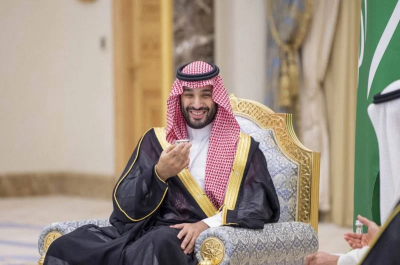Saudi Crown Prince Mohammad bin Salman on Dec. 7, 2021, during an official visit to the United Arab Emirates. (Credit: Bandar al-Jaloud/AFP)
No former prime minister will stand for the parliamentary elections, slated for May 15. Future Movement leader and former premier Saad Hariri bowed out of politics. For their part, Tamam Salam, Fouad Siniora and current Prime Minister Najib Mikati preferred not to run either.
Could this presage a Sunni boycott of the vote? It does not seem so. Siniora and Mikati are putting together lists for the elections. Most importantly, Saudi Arabia seems to be looming on the horizon, and could make a play that would allow Lebanon’s Sunnis to regain their strength.
The Wahhabi kingdom almost completely severed diplomatic ties with the land of the cedars on Oct. 29, 2021, recalling its ambassador to Lebanon, Walid Bukhari.
But as the polls draw nearer, Riyadh appears to be taking an interest in Lebanon once again.
Last week, Siniora met with a Saudi official in Paris. According to information obtained by L’Orient-Le Jour, the latter insisted on the need for the Sunnis to run in the elections so as not to leave the field open to Hezbollah, but remained vague about Saudi support in this regard.
No one knows today how much Saudi Arabia is willing to get involved in the elections.
Riyadh’s main allies in Lebanon, namely the Sunnis led by Siniora, the Progressive Social Party and the Lebanese Forces, all gave the same reply: “Saudis insist on a solid alliance of the former March 14 forces and on serious project,” according to a senior PSP official, who spoke to L’Orient-Le Jour on condition of anonymity.
Paris is also working to encourage Riyadh to become more involved in Lebanese affairs. The French insist on two points with their Saudi counterparts: The importance of humanitarian aid, to have $100 million divided up between different sectors, and to prevent any scenario of power vacuum on the Sunni scene that plays into Hezbollah’s hands.
“The elections are not going to fundamentally change the situation or allow the necessary reforms to be undertaken,” a Western diplomat, who requested anonymity, told L’Orient-Le Jour.
“But it would be a mistake to hand the country over to Hezbollah, especially since when the times come to negotiate a way out of the crisis, all parties present in Parliament will have to take part in the discussions and have a say in the matter according to their electoral weight,” the source added.
From a Western standpoint, the elections must restore a political balance, even if only to a small extent, by trying to prevent Hezbollah and its allies from obtaining a majority.
L’Orient-Le Jour learned that a joint French-Saudi committee has been formed to allow better coordination between the two countries on Lebanon.
It is made up of six people, including three Saudis: Nizar al-Aloula, representing the Royal Court; Walid Bukhari, representing the Saudi Foreign Ministry, and Khaled Saadoun, a senior intelligence official.
On the French side, the president’s Middle East adviser, Patrick Durel, is leading his country’s delegation.
“The committee has recently held two meetings in relation to the elections and humanitarian aid,” said a Saudi official requesting not to be named.
Return of Bukhari?
According to information obtained by L’Orient-Le Jour, Riyadh is showing an increasing interest in the Lebanese vote, and especially its results.
“Saudi Arabia wants to help produce new political personalities in the wake of the elections,” the Western diplomat said.
Paris is also trying to convince its Saudi partner to send its ambassador back to Beirut to be present for the humanitarian aid distribution and mark the occasion. The Saudis have promised to seriously consider this, according to L’Orient-Le Jour’s information.
“This would be very significant for the next steps, because he [Bukhari] would be holding private and public meetings with different political figures to deal with the parliamentary elections,” the Western diplomat said.
For the moment, Riyad does not intend to take any official position on Lebanon. But behind the scenes, it is encouraging its key allies to participate in the elections.
During a meeting in Riyadh in December 2021, Saudi officials made sure to convey the same message to two former ministers, Melhem Riachi (LF), and Wael Abu Faour (PSP).
Saudi officials made it clear that Hariri would not be a candidate in the elections, while promising that the kingdom would support them if they joined forces with Sunni parties.
“The time of cash flowing from Saudi Arabia is long over. But the Saudis can help intermittently and under specific conditions,” a Lebanese official close to Riyadh said.
On the Lebanese scene, there are concerns that the Saudi silence could dissuade Sunnis from participating in the vote, especially if the list sponsored by Siniora joins forces with the LF, whose relations with Saad Hariri became strained.
Hariri made it clear to his entourage that he was against any alliance with the LF.
But, L’Orient-Le Jour learned the Saudis have requested that the French “advise” the Future Movement leader to stop meddling in the electoral process and to get out of Siniora’s way.
According to one of his close associates, Hariri was expected to issue a statement calling for a boycott of the elections. Several major stakeholders, however, including Paris and Abu Dhabi, are said to be trying to convince him to tone it down in any statement he will make, and simply thank those who have supported him instead.
This article was originally published in French in L'Orient-Le Jour. Translation by Sahar Ghoussoub.
